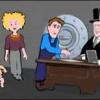| Online: | |
| Visits: | |
| Stories: |
Is This What Really Killed the Dinosaurs?
Discussions concerning all matters of humanity’s ascension into a higher dimensional existence culminating in 2012

Excerpt from time.com It wasn’t just an asteroid
At the start of the 1980s, the question of what forced dinosaurs and huge numbers of other creatures to become extinct 65 million years ago was still a mystery. By the decade’s end, that mystery was solved: a comet or asteroid had slammed into Earth, throwing so much sun-blocking dust into the air that the planet plunged into a deep-freeze. The discovery of a massive impact crater off the coast of Mexico, of just the right age, pretty much sealed the deal in most scientists’ minds.
But a second global-scale catastrophe was happening at much the same time: a series of ongoing volcanic eruptions that dwarf anything humans have ever seen. They were so unimaginably powerful that they left nearly 200,000 square miles (518,000 sq. km) of what’s now India buried in volcanic basalt up to a mile and a half thick. And the gases and particulate matter spewed out by those eruptions, argue at least some scientists, could have played a big role in the dinosaurs’ doom as well.
How big a role, however, depends on exactly when the eruptions began and how long they lasted, and a new report in Science goes a long way toward answering that question. “We can now say with confidence,” says Blair Schoene, a Princeton geologist and lead author of the paper, “that the eruptions started 250,000 years before the extinction event, and lasted for a total of 750,000 years.” And that, he says, strengthens the idea that the eruptions could have contributed to the mass extinction of multiple species.
Schoene and his co-authors don’t claim volcanoes alone wiped out the dinosaurs; only that they changed the climate enough to put ecosystems under stress, setting them up for the final blow. “We don’t know the exact mechanism,” he admits. Volcanoes emit carbon dioxide, which could have triggered an intense burst of global warming, but they also emit sulfur dioxide, which could have caused global cooling. “What we do know,” Schoene says, “is that earlier mass extinctions were caused by volcanic eruptions alone.” The new dates, he and his co-authors believe, will help scientists understand what role these volcanoes played in the dinosaurs’ demise.
If there was such a role, that is, and despite this new analysis, plenty of paleontologists still doubt it seriously. The dating of the eruptions, based on widely accepted uranium-lead measurement techniques, is not an issue, says Brian Huber, of the Smithsonian Institution. “That part of the science is great,” he says. “It moves things forward.”
And those data, Huber says, make it clear that the extinction rate for the 250,000 years leading up to the asteroid impact wasn’t especially large. Then, at the time of the impact: whammo. The idea that volcanoes played a significant role in this extinction event keeps coming up every so often, and in Huber’s view, “the argument has gotten very tiresome. I no longer feel the need to put any energy into it. It’s from a minority arguing against overwhelming evidence.” http://ascensionearth2012.blogspot.com
Source: http://www.ascensionearth2012.org/2014/12/is-this-what-really-killed-dinosaurs.html




